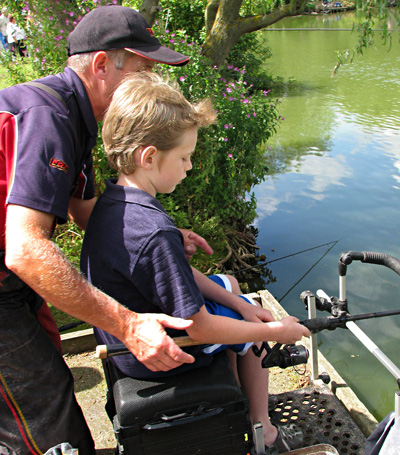In recent years there has been a steady decline in the number of young people fishing here in the UK. While this can be attributed to many things technology must bear the brunt of the blame, and to my mind it is certainly a major contributing factor, helping to generate the current ‘Xbox generation’ of couch potato kids who do little more the sit in front of the telly, play computer games and use their phones for God knows what all day. This is certainly a problem as it means there are far fewer people, children in particular, going outside at all, let alone going fishing.
 Technology is not the only problem though, a lack of young people being taught how to fish by their parents and relatives is another reason; the vast majority of current anglers were introduced to fishing by someone in their family and without that help a great many potential future anglers are never going to get a chance to even try it. Think about it, just how did you get into angling?
Technology is not the only problem though, a lack of young people being taught how to fish by their parents and relatives is another reason; the vast majority of current anglers were introduced to fishing by someone in their family and without that help a great many potential future anglers are never going to get a chance to even try it. Think about it, just how did you get into angling?
Fishing is a great pastime, but it can be very difficult to get into if you don’t know someone who already does it; it’s not just the difficulty of finding a place to fish, getting a licence and buying all the equipment, but fishing itself can be, on a technical level, very difficult.
There are a huge variety of rods and reels, a myriad of seemingly impossible knots and, on top of that, an unbelievable selection of lines, weights, baits, groundbaits, hooks, flies, lures, floats, scales, rod rests, carp mats, and bite detectors – and that’s before you start to look at the different types of fishing that is out there: coarse fishing, sea fishing, fly fishing (trout and salmon), pike fishing, carp fishing, mackerel fishing, bass fishing shark fishing, livebaiting, deadbaiting, ledgering, float fishing, lure fishing and pole fishing to name but a few…This can all seem very intimidating to the newcomer and without someone to guide them through it all they are likely to struggle to come to terms with it all.
The next problem is a cultural one; fishing is just not considered ‘cool’ by today’s children. This in itself may largely be down to the lack of attention fishing gets in today’s media, there are very few computer games focused on fishing, it’s rarely portrayed in films and if it is, usually only very briefly, and crucially, there seems to be a real lack of decent fishing programmes on the television. The few that do exist seem to focus more on big game fishing for things like marlin and shark than the kind more commonly available in this country, the even smaller number of programs that do concentrate on fishing in Britain are relegated to the minor channels that not everyone can access or they are on very early in the morning or at the weekend – not exactly prime time. If there was a decent fishing program on a mainstream channel at a time when children could watch it, it would help spark an interest in those who have not been introduced to angling by a family member.
Better still would be an angling programme specifically aimed at kids as that would attract far more young viewers, and would perhaps help alleviate any kind of stigma that may have developed of fishing being a sport reserved for the older generation.
Another thing that links with my earlier points about technology and needing a family member to teach you is the growing concern over health and safety and more pertinently the sometimes over-protective nature of parents these days. All things considered this is not necessarily a bad thing, you certainly don’t want small children on their own near water, but this doesn’t mean you have to keep them permanently shut indoors; in fact a fishing trip may be the perfect opportunity for a day out with your kids. If adults who have never been fishing were to take it up, and include their children, chances are they will take it up too.
There would appear to be as many answers to this problem as there are reasons it exists, and perhaps no single solution will work, but if two or three were to be implemented together then I believe there would be a significant improvement in the number of kids wanting to participate.
Whatever the solution, it is clear something needs to be done; angling is still the number one participatory sport in Britain but in the last four years there has been drop of almost fifty per cent in the number of juniors fishing, and if the decline continues at this rate fishing as a pastime will be in serious danger of dying out – so whatever can be done must be done now!
To elude to what I said earlier the easiest thing that we can do as fishermen is to introduce people we know to angling, be they a relative or a close friend, teach them to fish and hopefully they’ll pass on what we have taught them to someone else, to borrow a term from a film, ‘pay it forward ‘, do that, and fishing won’t be in trouble anytime soon.













